Pride of place
Carol and Ashley celebrate Britain’s heroes at aw ards
‘Queen Elizabeth asked me to be her chaplain’



Carol and Ashley celebrate Britain’s heroes at aw ards
‘Queen Elizabeth asked me to be her chaplain’


The Salvation Army is a Christian church and registered charity seeking to share the good news of Jesus and nurture committed followers of him. We also serve people without discrimination, care for creation and seek justice and reconciliation. We offer practical support and services in more than 700 centres throughout the UK. Go to salvationarmy.org.uk/find-a-church to find your nearest centre.
The Salvation Army first published a newspaper called the War Cry in London in December 1879, and we have continued to appear every week since then. Our name refers to our battle for people’s hearts and souls as we promote the positive impact of the Christian faith and The Salvation Army’s fight for greater social justice.
Editor: Andrew Stone, Major
Deputy Editor: Philip Halcrow
Assistant
Staff
Staff
Editorial
Graphic
Graphic
Sarah Olowofoyeku
Emily Bright
Claire Brine
Linda McTurk
Mark Knight
Natalie Adkins
Email: warcry@salvationarmy.org.uk
The Salvation Army
United Kingdom and Ireland Territory 1 Champion Park London SE5 8FJ
Tel: 0845 634 0101
Subscriptions: 01933 445445 (option 1, option 1) or email: subscriptions@satcol.org
Founders: William and Catherine Booth
International leaders: General Lyndon Buckingham and Commissioner Bronwyn Buckingham
Territorial leaders: Commissioners Jenine and Paul Main
Editor-in-Chief: Major Julian Watchorn

When a young girl called Rose grew up in 1960s Jamaica there would have been few, if any, people who would have predicted that she would one day work as a chaplain to Queen Elizabeth II. Yet, as we discover in an interview with Bishop Rose Hudson-Wilkin, that is exactly what happened.
By the age of 14, she believed that God wanted her to be a church leader, but Rose – who is now Bishop of Dover – encountered obstacles to her achieving that goal in the form of sexism and racism.
Through it all, though, she was helped by her Christian faith.
‘One of the first Bible verses I learnt to memorise as a child in Sunday school was John 3:16: “For God so loved the world.” For God so loved Rose. I remember being absolutely amazed that God could love me,’ she tells us. ‘God is this big superhero. He knows who I am.’
Christians believe that God doesn’t just want to help people who believe in him. They insist that God loves everyone – ‘the world’ –whoever they are and whatever situations they find themselves in.
That’s why many individual Christians and churches work hard for the benefit of people in distress, to help them have hope for the future.
Every year The Salvation Army helps thousands of people who have been rescued from modern slavery. It provides them with accommodation and then guides them through the processes of reclaiming their lives. The church and charity is motivated to do these things because of the Christian beliefs that underpin everything it does.
In this week’s War Cry one survivor of modern slavery tells her story and describes how The Salvation Army helped her back on her feet again after years of abuse.
‘They have been amazing to me,’ she says. ‘When I arrived here I didn’t see myself as a human being… Now, with the help of The Salvation Army, I’m getting my confidence back.’



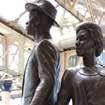
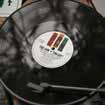

Feature by Sarah Olowofoyeku
Ordinary people doing extraordinary things will be celebrated on Monday (21 October) at the Pride of Britain awards. Marking their 25th anniversary this year, the awards, hosted in London by Carol Vorderman and Ashley Banjo, recognise individuals and groups who have made a difference to the lives of others.
While other awards are often reserved for the rich and famous, this ceremony gives a chance for unsung heroes to shine in eight categories: community hero; fundraiser of the year; young fundraiser of the year; emergency services award; outstanding bravery; child/teenager of courage; lifetime achievement; and special recognition.
While the winners are rarely celebrities, well-known figures also attend the event and give out awards. Over the years the audience has included Diana Ross, Dame Helen Mirren, David and Victoria Beckham, Idris Elba and Sharon Stone. Previous winners have included teacher Ray Coe, who donated a kidney to a student who was too sick to go to school; eight-year-old Hope Farrelly, who
delivered her baby brother at home; and Sandra Blockley, who raised £1 million for cancer and dementia charities.
Other winners have been courageous in the face of danger and hardship in instances which show the best and the worst of humanity. Renée-Mai Bolter was a young girl when she helped protect her mother and baby sister from beatings after they were taken hostage by a jealous handyman. Doreen and Neville Lawrence campaigned against injustice after the racist murder of their son and received a special award in the first ceremony a quarter of a century ago.
Carol Vorderman, who hosted that ceremony and all the others since, says: ‘The world was a very different place in 1999 – no smartphones, no social media, a new millennium on the horizon, the use of internet in its infancy. But some things never change. In 2024, just as in 1999, there are incredible people, young and old, who deserve to be recognised for their awe-inspiring courage.’
Across the world and across time, people have carried out remarkable acts of courage and compassion. Not many

of them will have had their names up in lights, and to most of the world they would have seemed ordinary and unimportant.
One figure who was seen by many as ordinary but who demonstrated courage to help others was Jesus. Originally known as the son of a carpenter, he broke the social norms of the day to help people who were sick and to show love and compassion to those on the margins of society.
The truth is that Jesus was God’s Son, and in the ultimate act of courage, he sacrificed his life for all of humanity.
We can never be perfect. As the Bible says, ‘everyone has sinned; we all fall short of God’s glorious standard’ (Romans 3:23 New Living Translation). But, because Jesus took on the consequence of our wrongdoing in his death, we can be forgiven. And, because he was raised to life, we can go on living when our time on Earth is over and one day experience a world with no pain and suffering.
All we have to do is to accept the extraordinary thing that Jesus has done for us.
on
‘It’s not unusual to turn up to a theatre having no clue about the play you’re about to see,’ wrote Dominic Maxwell in The Times ‘It’s less usual to turn up to a theatre having no clue about the play you’re about to perform.’ But, he went on, that’s what’s happening at Sohoplace in London for a number of well-known actors, including Michael Sheen, Lenny Henry and Minnie Driver.
Every night until 9 November, an actor walks on to the stage and picks up a script contained in an envelope. Then, without rehearsal but with script in hand, they must act it out in front of an audience.
The fact that they don’t know anything about the one-person play they are about to perform –called White Rabbit Red Rabbit – means that one actor may end up interpreting the lines completely differently from another actor. Consequently, the whole tone of the drama could change from night to night, depending on how each performer feels compelled to act it.
For the play’s writer, Nassim Soleimanpour, that’s part of the appeal.
‘These cold reads are fuelled by curiosity,’ he explains. ‘I say to the actors, “Be curious. Be yourself. Be honest.”’ He also adds that ‘any mistake is forgiven’.
I like Nassim’s approach. It allows for the actors’ creativity and encourages them to take a leap of faith. It recognises the value of authenticity and seeking the truth. It also understands that mistakes are bound to happen – and, as a result, forgiveness is freely offered.
While Nassim feels that all these things can help an actor succeed on stage, I believe that such advice works well in other scenarios.
In real life, I don’t know how the story of my life is going to play out. Every day, I’m improvising. But as I move through scenes of joy, sadness and who knows what else, I’m comforted by my faith in God. He doesn’t promise me that tomorrow is going to be easy. There will (almost certainly) be times when I mess up.
But, in each new moment, I can ask God for help. I can say I’m sorry for getting it wrong. And, when I do, I can pick myself up and try again – because he promises that any mistake can be forgiven.

nA schoolgirl whose greatgrandfather was helped by The Salvation Army made bracelets to raise money for the church and charity.
Francesca Heywood from Harrogate donated more than £80 to Wetherby Salvation Army after making and selling some 30 personalised bracelets (pictured) to friends and family.
The 12-year-old said: ‘We’ve always leaned towards The Salvation Army because a long time ago my dad Graham’s grandad relied on them when his own dad got injured in the mines and could no longer work.
‘My great-grandad had to drop out of school to support the family, and at that time The Salvation Army really helped them out with food, clothing and community support.
‘Eventually my great-grandad Eric was able to go back to school and get an education and had a successful career in the railways, but he always credited that help he got from The Salvation Army, with helping him do that. Because of The Salvation Army, I’m here now and am happy and blessed, so I wanted to give back to them.’



Taylor Swift made ITV News headlines after donating to a Christian food bank charity during the UK leg of her Eras tour. According to the online article, the singer made multiple donations to Trussell Trust’s 1,400 food banks and community organisations in Edinburgh, Liverpool, Cardiff and London, the cities where she performed.
Sophie Carre, the director of public engagement at the charity, said it was delighted by Taylor’s generosity, which provided help at an important time when demand for its services were high.
Sophie went on to explain that the singer’s donations put a spotlight on Trussell Trust, which was helpful in the run-up to winter and ‘the incredible levels of need that we know the food banks will need to meet’.
The work of Trussell Trust is inspired by the Bible’s Book of Micah, which calls people to ‘act justly and to love mercy and to walk humbly with your God’.
A class at Watford Salvation Army’s allotment
The writer behind a hit Netflix sitcom said that the story was inspired by the Bible and immigrants.
Ins Choi wrote the play Kim’s Convenience, which was developed into a TV sitcom of the same name and picked up by Netflix. He told the Church Times that he grew up in a Korean church in Canada, where his father was a pastor, and spent time around Korean immigrants to Canada who worked in small convenience stores.
The plot echoes the story of the prodigal son in the Bible.
‘The word prodigal, I read somewhere meant wasteful,’ he said. ‘So that title can be applied to the son who wastes the inheritance, but it could also be applied to the dad as it applies to our heavenly Father, who it can be seen, [spends] a wasteful amount of love on us.’
Of other Bible stories, he said: ‘Most of them are depictions of humanity’s lack of faith or trust, or our need of the Divine… They are foundational for me and my way of talking about stories, or how I write stories, but it’s not so conscious.’
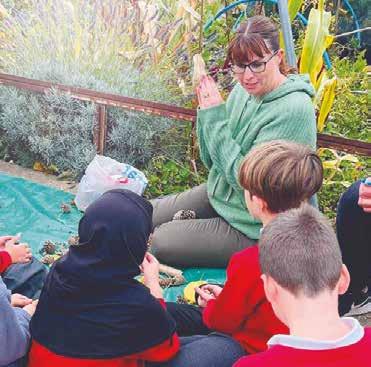
The Salvation Army in Watford has won an award for its community allotment. The project was awarded a £1,000 prize for congregation and community action at the Church Times Green Church awards.
The objective of the awards is to celebrate the efforts made by congregations to offset the damage being done to the Earth and set good examples for others.
The congregation and community action category recognises projects where a church, school, or other group has taken a leading part in environmental action, benefiting the wider community as well as its own.
At The Salvation Army in Watford, more than 120 pupils and staff from the nearby Cherry Tree Primary School visit the community allotment each week to learn gardening skills, take part in forest school and enjoy events such as harvest celebrations.
Pupils with additional needs and behavioural struggles have benefited from the time outdoors, learning patient gardening skills and being surrounded by nature.

‘I
Every year thousands of people are trafficked into the UK, where they are forced to do unpaid work, sexually exploited and physically abused. For 13 years The Salvation Army has held a government contract to provide specialist support for adult victims of modern slavery. Ahead of Anti-Slavery Day on 18 October, one of those survivors told her story
Feature by Sarah Olowofoyeku
They can be found in shops, in restaurants and passing by in the street. Hidden in plain sight and trapped in a life that they did not choose, they are the tens of thousands of people in the UK who have been trafficked into modern slavery.
Last year 3,533 of those people received support from The Salvation Army. In its 14th year of holding the government contract to provide specialist support for adult victims of modern slavery in England and Wales, the church and charity continues to be committed to the cause.
Its specialist work consists of meeting people who have been found to be in modern slavery, transporting them to safe houses – where they can be given advice and care – and helping them to find healing from their trauma.
One of the people who have been helped by The Salvation Army is Rose. She told some of her story to BBC News earlier this year to raise awareness of modern slavery, and she tells us more.
Rose was brought over to the UK in 2019 from Nigeria by a couple who told her and her parents that she would be given exciting opportunities.
Rose says: ‘Before I left home, the family told me that they would help me to study if I took care of their child. I was promised so many good
things and I believed them, because I couldn’t imagine something bad happening in a country like the UK.’
Initially, the couple treated Rose well. She was happy. But she ended up trapped in their home for four years. The life she had been promised was not the one that she ended up living.
‘I was made to do everything,’ she says. ‘I was babysitter, housekeeper and also chef and cleaner in the restaurant that they ran – all for no money. They said that, as I was paying them no rent and I didn’t pay any bills, they wouldn’t give me any wages.
‘I worked every day. I was at the restaurant six days a week, up early to get the child ready for school, back to clean the house and cook for the family, then looked after their child while they were at work. At five in the evening, I was sent to the restaurant, where I had to cook, serve customers and clear up in the kitchen – often not getting back until two in the morning. I would sometimes only get two or three hours’ sleep a night.’
Rose was not allowed to stop working, even when she was unwell. The couple began to abuse her verbally and
psychologically.
‘They would shout at me and call me names if I asked for money or a rest,’ she says. ‘They watched me all the time, because every room had CCTV. They kept saying that they would fulfil their promise of helping me to study, but eventually I realised they had only brought me here to work for them as a slave. After six months my visa expired and they didn’t renew it. After a while they stopped me talking to my parents.
‘The wife slapped me and then she returned to Nigeria for a trip. All the time she was away, the husband was raping me. This was the worst time of my life. I felt hopeless, empty and exhausted. My life was meaningless.’
I didn’t see myself as a human being
Butone day, after a conversation with a regular customer at the restaurant, Rose realised that she had a way out. He advised her on how to get evidence of her abuse, and helped her to contact the police, who then called The Salvation Army.

‘I was brought to this safe house,’ Rose says. ‘I arrived at about two in the morning, but someone was there to greet me. She told me I had nothing to worry about now, that I was safe and that it was her job to protect me. She showed me to a beautiful room which was mine. I was so happy.
‘They have been amazing to me. I’ve been here six months and I feel OK. I’ve been doing online courses. I talk to my parents every day. I’ve met so many kind-hearted people here.
‘When I arrived here I didn’t see myself as a human being, because of the things the couple had done to me. Now, with the help of The Salvation Army, I’m getting my confidence back. I know my future is very bright and hopeful. If one person is helped by hearing my story and doesn’t have to suffer what I did, then I will be so glad.’
lRose’s name has been changed. If you suspect someone is a victim of modern slavery and in need of help, call The Salvation Army’s confidential 24/7 referral helpline on 0800 808 3733


‘I grew up with a sense that we are made in
To mark Black History Month, Bishop ROSE HUDSON-WILKIN tells of her upbringing in Jamaica, what it was like to serve as chaplain to Queen Elizabeth II and how she believes Jesus champions the vulnerable
Interview by Emily Bright
Once chaplain to Queen Elizabeth II, then to the Speaker of the House of Commons, the Right Rev Rose Hudson-Wilkin has an impressive CV. But she is quick to attribute her achievements to the ‘terrific difference’ that God has made in her life.
‘How does a little girl from Montego Bay, Jamaica, who grew up in humble and poor circumstances, end up as a chaplain to Her Majesty?’ she asks herself as we speak over Zoom.
It is quite a story, which Rose – who became the Church of England’s first black woman bishop in 2019 – recounted to me ahead of Black History Month. This year’s theme of Reclaiming Narratives seemed particularly apt for the interview.
Rose’s journey from the Caribbean to Windsor Castle is one of resilience, faith and determination. Growing up in Jamaica at a time when women were unable to become priests in the Anglican Church, she emigrated to the UK at the age of 18 to train as an evangelist with Anglican mission agency the Church Army. From there, and in the face of racist exclusion in society, she has risen to become Bishop of Dover. She was lauded in the press as a trailblazer. But such attention felt like a mixed blessing to Rose, who speaks with warmth, wisdom and humility. She hopes that the narrative of women black bishops becomes normalised rather than being a
news story.
‘I don’t take the role lightly,’ she explains. ‘It comes with a huge weight of responsibility. When they’re looking to reappoint someone, I’ve never heard anyone say: “We’ve done the white guy before. Let’s go for something completely different.”
‘It doesn’t matter how mediocre that white guy is, but if it’s a woman, or if the person is black, or even disabled, you hear people say, “Oh well, we’ve tried that already, we won’t try it again.”
‘I want to ensure that when I’ve moved on, they’ll be able to say: “We had a terrific black woman. Let’s do that again.”
There is also some level of frustration because it means that we’re not there yet. If it’s normal, we don’t need to talk about it being the first.’
The novelty of a black woman bishop is perhaps indicative of a wider racial bias in the UK, which Rose first encountered on her arrival. It came as a shock.
‘I no longer saw any signs of “no Irish, no blacks, no dogs”, which my parents’ generation would have seen when they were here. But it was the subtle ways of people being excluded, or the expectation that certain people wouldn’t do well because of their background.
‘I never expected to find racism. The stories we heard back in Jamaica were of England as the place to go if you
wanted to find prosperity. Our parents’ generation came to rebuild Britain after the war and took part in the National Health Service.’
Rose believes that being brought up in Jamaica meant she had a certain confidence in who she was.
‘Compare that to some of my peer group, who were born here and who had doctorates,’ she says. ‘If we were to hold the two together, and see who is exuding more confidence, it would be me coming from the Caribbean.’
Rose was born in Jamaica in 1961, the year before the country declared its independence from colonial rule.
‘We were very aware of our history as a people, coming from a place of enslavement,’ she recalls. ‘That was still in the fabric of our society, as we tried to find ourselves
Turn to page 10 f

With the Archbishop of Canterbury at her installation as Bishop of Dover

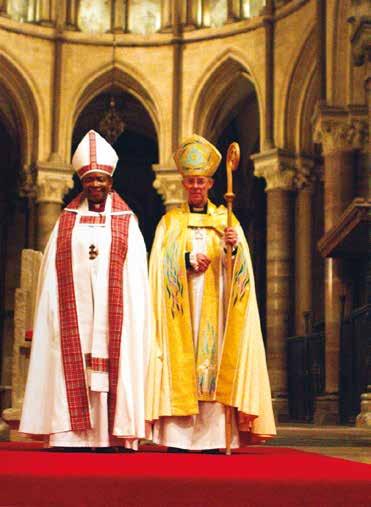
From page 8
and become a nation without simply being an offshoot of Britain.’
Growing up in a poor family, Rose was no stranger to hard work and creative thinking.
‘We didn’t have a tap in our house, and we had outside toilets,’ she says. ‘Life was full of chores, like carrying water. As kids, we would have to go further away to get the water – which we would fill oil drums with – so the adults wouldn’t have to.
‘But there was also freedom. We didn’t have toys given to us. It perhaps would have been a luxury that no one could afford. Instead, we went into our minds and created toys.
‘We made things from the environment around us. Old cardboard would be made into a doll’s house. We would play shop and pick things up from the garden. We would make balls and bats from throwaway bits of rubber.
‘It was a creative time. I tell my children and grandchildren that “bored” was never part of my vocabulary growing up.’
I preached my first sermon when I was 14
Rosealso remembers that she was an avid reader, who made full use of a mobile library parked on church premises. She describes her younger years as ‘tough days, but enjoyable days’.
Her childhood had added complications: her mother emigrated to the UK as part of the Windrush generation when she was a baby, and Rose’s paternal aunt became her primary carer. Seven years later, her mother returned to Jamaica.
‘When my sister and I went to live with her, I was then sent back to Montego Bay,’ Rose remembers. ‘Then when she got back from the UK, I tried to get to know her. That was challenging as a child and there were some sadnesses around that. But those years made me the person I am today.’
One defining characteristic of Rose’s childhood was her faith. She describes herself as a ‘cradle Anglican’ who was baptised at three months old. She has never left the church since.
‘Faith was part of my life from very early on,’ she says. ‘One of the first Bible verses I learnt to memorise as a child in Sunday school was John 3:16: “For God so loved the world.” For God so loved Rose. I remember being absolutely
amazed that God could love me. After all, I felt my mother didn’t love me, or my father for that matter.
‘But God is this big superhero. He knows who I am, and he says: “I want you to be my child.” I am God’s. That’s even more important than belonging to my birth parents.
‘I had some really great adopted parents. There was no formal adoption, but they were people who I adopted as my mummy and my daddy. They adopted me too, informally, as their daughter. That was by the love and grace of God.’
Faith not only gave Rose a sense of identity as God’s child but also – from a young age – encouraged her to pursue a life of ministry.
‘We didn’t have a priest every week in our church,’ she says. ‘That meant children and young people were encouraged to take part in leading worship. I preached my first sermon when I was 14.’
And at 14, she discovered her vocation. After a vivid dream she picked up her Bible, which opened at the fourth chapter of Luke’s Gospel. In that chapter, Jesus reads from the synagogue scroll of the

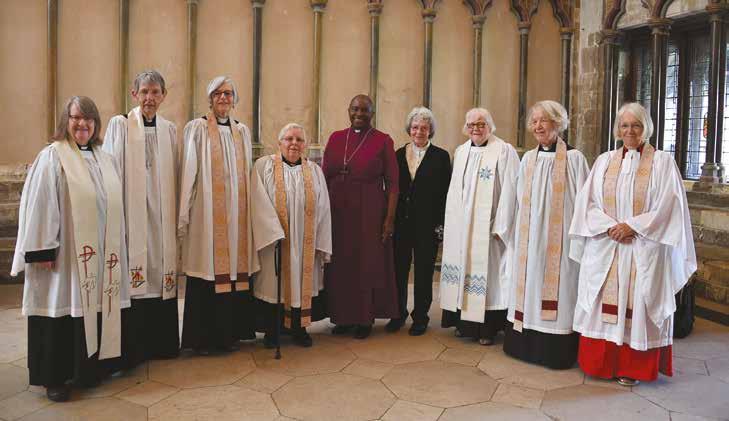
prophet Isaiah. It says: ‘The Spirit of the Lord is upon me, because he has anointed me to proclaim good news to the poor. He has sent me to bind up the broken-hearted.’ From that moment, Rose believed that God was calling her into ministry, and her resolve was set.
‘I kept going forward, even when the church said, “No, you’re a woman.” I remembered saying to God: “The church doesn’t want to have me, but I believe you have called me, and I’m going to continue to be faithful to you, God. When you are ready, when the church is ready, I’ll be ready.”’
I was invited to dinner with the Queen
It was this grounding in faith that would help Rose combat the prejudice that she would later face after being ordained as a priest in 1994, the first year in which women could become priests in the Church of England. She believed she knew the truth of her value to God, regardless of any painful things people said.
‘I grew up with a real sense that we are made in the image of God,’ she says. ‘If anyone else tells you otherwise, then they’re lying, and it’s their problem. I’ve always taken that view. But it doesn’t mean that it doesn’t hurt when you experience racism.
‘When somebody prevented me from doing their family funeral, for example, I allowed myself to feel the hurt of being rejected. But then I pulled myself together again and said: “Rose, it’s their loss because you do a damn good funeral.” Our Lord talks about shaking the dust off your feet and moving on.’
In 2007, while she was serving as a priest in Hackney, Rose received a job opportunity that would change the course of her life.
‘The late Queen asked for me to serve as one of her chaplains,’ says Rose. ‘It was a beautiful, pleasant surprise. I was invited to dinner with her and her husband. Sadly the Duke of Edinburgh was ill at the time, so he joined us for tea but not for dinner. Prince Edward took his place, so I sat next to him. The Queen was an amazing host.
‘That was very special. When I was appointed, the Jamaican press had a big splash which said: “A Jamaican Rose in the Queen’s garden.” I did share it with her once, and she thought it was hilarious.
‘She was a lovely woman. I thought of her first and foremost as a mother, grandmother and great-grandmother. Then afterwards as Queen. She was a human being made in the image of God, who just happened – because of her royal line – to be our Queen.’
Rose explains that chaplains to the monarch preach or take services in their many private chapels. When there were
garden parties, she would go along too. She describes the role as ‘a real joy’.
Her next high-profile appointment came in 2010 after her husband spotted a job opening as the Canon of Westminster, rector of the neighbouring St Margaret’s Church and chaplain to the Speaker of the House of Commons. Initially, Rose was unsure whether to apply. But, she recalls, it was an opportunity for her to get faith into the public square.
‘Faith must be where we live, where we work, where we play,’ she says. ‘That excited me, and so I applied for the role. In the end, Westminster Abbey hired somebody else. But the Commons Speaker said: “You walked into the room, you had presence, you were dynamic. I had to have you.” So the job was split.’
As we conclude our time together, I realise that, while Rose has ministered to those in the highest corridors of power, she believes in a God who cares for all people, regardless of their status. She tells me that she is often struck by how Jesus empowers the marginalised and vulnerable, including women.
‘There’s something about Jesus that draws him to the last, the lost and the least. He asks: “I was hungry and thirsty, did you feed me? Did you give me a drink? I was sick and in prison, did you come and visit me? I was naked, did you give me any clothing?” It seems to me that Jesus had an eye for those who were most vulnerable.’
The War Cry invites readers to send in requests for prayer, including the first names of individuals and details of their circumstances, for publication. Send your Prayerlink requests to warcry@salvationarmy.org.uk or to War Cry, 1 Champion Park, London SE5 8FJ. Mark your correspondence ‘Confidential’.
There is no set formula to becoming a Christian, but many people have found saying this prayer to be a helpful first step to a relationship with God
Lord Jesus Christ,
I am truly sorry for the things I have done wrong in my life. Please forgive me. I now turn from everything that I know is wrong.
Thank you that you died on the cross for me so that I could be forgiven and set free.
Thank you that you offer me forgiveness and the gift of your Holy Spirit. Please come into my life by your Holy Spirit to be with me for ever.
Thank you, Lord Jesus. Amen

Eating fruit and vegetables is good for us – and, according to the Bible, a healthy inner life also includes fruit. In this series Peter Mylechreest takes his pick of nine life-enhancing qualities called ‘the fruit of the Spirit’
Jeannie was not having a good day. Her train had been delayed because of a signal failure, her computer at work had crashed, and now her infuriating supervisor wanted to know why a shipment hadn’t been sent.
‘Bear with, bear with,’ Jeannie pleaded, ‘and I’ll explain.’ Despite her supervisor’s aggressive tone and disbelieving look, Jeannie, a committed Christian, quietly and patiently described the relative facts.
The phrase ‘Bear with’ is linked with the word ‘forbearance’. Some Bible translations use the word when listing the qualities of the ‘fruit of the Spirit’. Most, though, use ‘patience’.
‘Patience is a virtue, possess it if you can; seldom in a woman, and never in a man’ runs the rhyme. But, actually, that’s not true. There are countless people who practise patience every day: the primary school teacher with their pupils, the neurosurgeon delicately extracting damaged cells, the lone angler fishing and the spouse dealing with their partner’s Alzheimer’s disease.
Despite these examples, there are seeds of impatience everywhere: the irritated man queueing; the woman not bothering to listen; the agitated young man not waiting; the young woman who cries ‘Give me strength!’ when what she needs is patience and wisdom. Surprisingly, impatience can be a good thing if it shakes us out of our complacency. But it is a bad thing when it stops us being grateful for what we have and leads us to be consumed with the desire for instant gratification.

Patience is often developed after a series of unhappy events, but the fruit of the Spirit is more than the endurance of tribulations or a quiet resignation to the problems of life. It is a choice not to retaliate, complain or grind one’s teeth. Christians believe that the patience given by God can help them to remain eventempered with people who are slow to learn or tolerant with those who have different opinions from them.
In doing so, they believe that they are mirroring the patience God shows them as they grow in their faith and in their understanding of him. And they see that being patient reduces their levels of frustration and anxiety.
Patience is good to grow.

To receive basic reading about Christianity and information about The Salvation Army, complete this coupon and send it to


1 2 3 4 5 6
Who plays the title role in the TV crime series Sister Boniface Mysteries?
Who wrote the score of the West End musical The Phantom of the Opera?
What is the largest lizard in the world?
The Forth Bridge links Fife to which city?
Who wrote the 18th-century satire Gulliver’s Travels? Cerulean, navy and sky are shades of which colour?
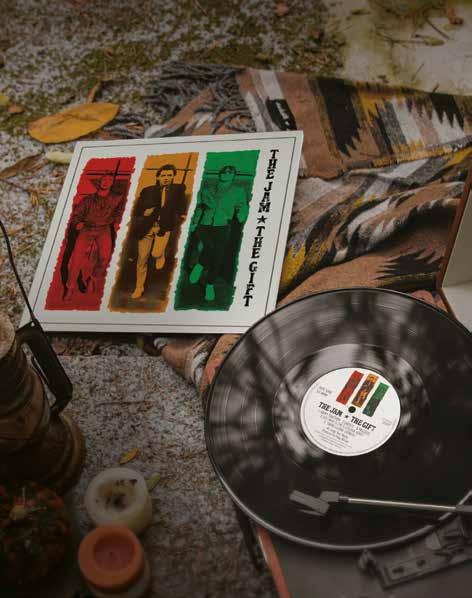
Feature by John Cheek
Listen up! Saturday (19 October) is National Album Day. In these days of downloads and streaming – as well as a so-called ‘vinyl revival’ –the day is a celebration of all things long-playing and recorded.
National Album Day celebrates whole collections of music, first heard on vinyl on 33⅓ before they expanded to cassette, compact disc and other formats. As society’s listening patterns change and more emphasis is placed on downloading or streaming individual tracks, it’s good to remember the value of the long-player in showcasing the abilities of an artist in one collection.
Albums are often made up of various types of tracks: with commercialsounding songs that were (and sometimes still are) released as singles, ballads, possibly a cover version of another artist’s song and maybe even a ‘hidden’ track at the end, not listed on the sleeve. Ah, the album sleeve – often the artwork has been an important part of the package too.
With this year’s theme of Great British Groups, there will be attention shown to landmark albums from artists such as the Beatles, the Rolling Stones, Soul II Soul, the Jam, the Smiths and the Spice Girls. Today, autographed copies of such albums can be worth thousands.
One of the drawbacks of the vinyl discs, however, was that they were easy to damage. Favourite songs could be ruined as the needle hit a scratch that caused it to get stuck on one note. The records couldn’t be repaired, and the album was spoilt for ever.
The feeling of regret that comes when we’re not able to mend something that’s broken isn’t confined to albums – or to physical objects. In life, things can sometimes go so wrong for us that we feel broken and have no hope of ever being fixed.
But Christians believe that we can all become whole by following Jesus. One Bible writer explained it like this: ‘Anyone who belongs to Christ has become a new person. The old life is gone; a new life has begun!’ (2 Corinthians 5:17 New Living Translation).
With Jesus we have the opportunity to experience our own revival, if we’ll get on track with him.
Communication (7)
Artificial silk (5)
Antiquated (7)
Get knowledge (5)
Abandon (4)
Scare (8)
Disregard (6)
Voucher (6)
Motorcycle sport (8)
Asian garment (4)
Rejoice (5)
Irregularity (7)
Engine (5)
Defame (7)
2. Part (7)
3. Slightly open (4) 4. Call for repeat (6) 5. Faith (8) 6. Leaven (5) 7. Agree (9) 9. Person of no importance (9) 12. To whom money is owed (8)

Poster (7)

Annoy (6)
Explode (5) 20. Concluding section in music (4)


4. Racket. 5. Racing. 6. Knight.
O M B
OPERA



INGREDIENTS
METHOD

1tbsp olive oil
400g potatoes, cubed
1 onion, chopped
1-2 garlic cloves, finely chopped
1tsp dried oregano
4 tomatoes, cut into wedges
1 yellow pepper, sliced
2 skinless white fish fillets
Freshly ground black pepper
Fresh parsley, chopped, to garnish
½ lemon, cut into wedges, to serve

INGREDIENTS
150g mashed potato
100g sweetcorn
2tsp parsley
1tsp thyme
120g can salmon in spring water or fresh salmon, rinsed and drained
1 egg, beaten
100g wholemeal breadcrumbs

Preheat the oven to 200C/Gas Mark 6.



Warm the oil in a roasting tin in the oven. Add the potatoes, onion, garlic and oregano and gently toss to coat with oil. Roast for 30 minutes, turning about halfway through the cooking time.
Add the tomatoes and yellow pepper to the roasting tin and cook for another 10 minutes. Top with the fish fillets and season with black pepper. Continue to cook for 10 minutes or until the fish is cooked through. Sprinkle with the parsley and serve with the lemon wedges.

METHOD
Mix all the ingredients, except the egg and breadcrumbs, in a bowl.
Divide the mixture into 8 portions and shape into round cakes. Place on a plate and chill in the refrigerator for 20 minutes.
After the cakes are chilled, dip them in the egg, then coat in breadcrumbs.
Place on a baking tray and cook under the grill for 4-5 minutes on each side, until golden brown. Serve with a side salad.

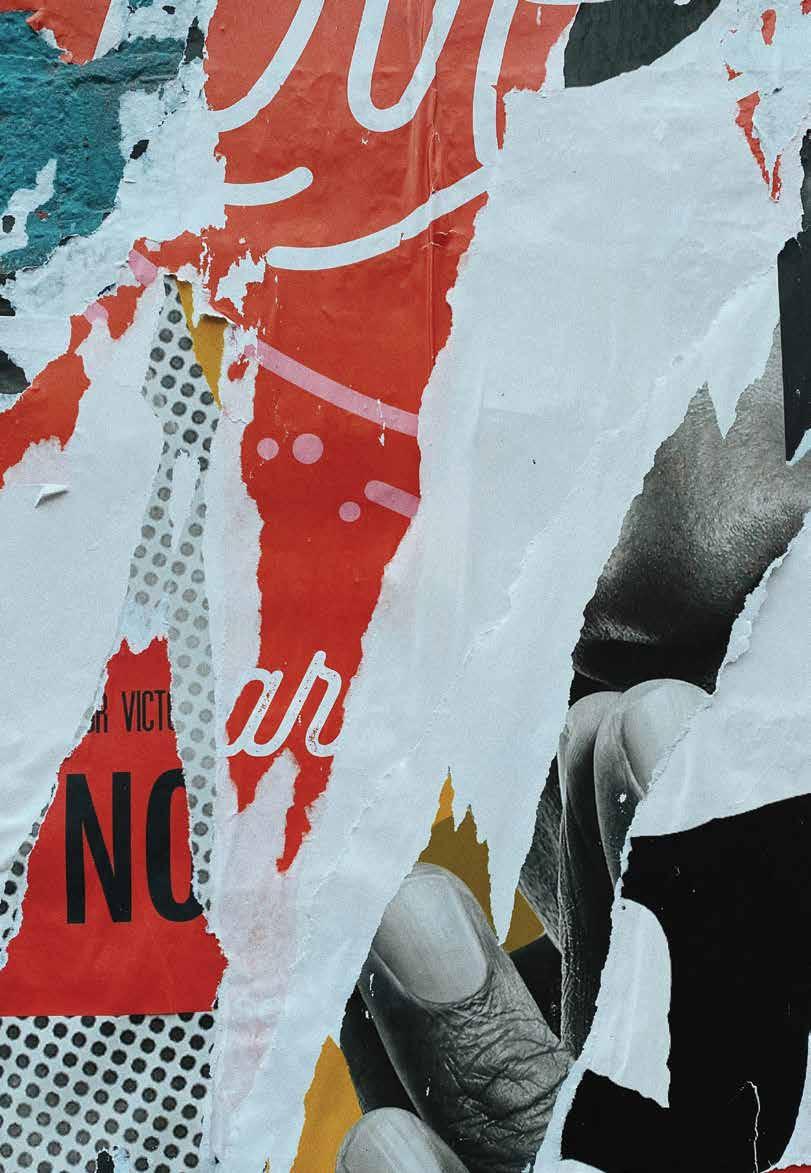
Philippians 4:8 (Contemporary English Version)